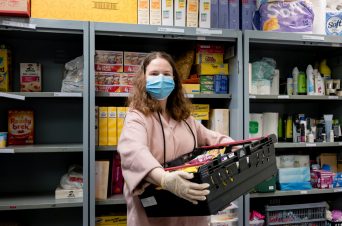
Lateral leadership and custodianship – a legacy of Covid?
blog | 26 Feb 2021
This piece is about leadership and governance, informed by the insights of 100+ front-line workers and leaders across Greater Manchester and their reflection on what they experienced and learned during their Covid response.
My career has been deeply associated with issues of leadership and governance – leadership in particular. I was a secondary headteacher for 14 years, then a founding Director at the National College for School Leadership (remember that?) and for more than a decade now I’ve coached themes of innovation, leadership and governance with the Innovation Unit.
So I have some things I’d really like to say that correlate with and inform our findings from the GMCA research.
Three things that I know to be true about leadership
The first point to make about leadership is that those in senior positions have to earn it, by creating or winning followership. We routinely – and wrongly – equate leadership with position. Position gives you authority, power, resources, management responsibilities, accountability. But it does not render you a leader.
The second point is that, because leadership does not by right reside in positions, it is not a finite resource. Put another way, in any organisation or system there is an infinite quantity of leadership, in most cases lying latent, waiting to be liberated, enabled and aligned. (For those who remember school physics, it is the difference between kinetic and potential energy.)
The third point may be the most important: leadership is not one-directional. It doesn’t just flow down a system from those above, or even travel up and down a system. For local systems, lateral leadership – operating between people working together across a system – might just be the undiscovered liberator.
Governance – one thing that really, really matters
Governance is a slippery concept, but a profoundly important one. Who governors are, what they do and how they add value is a bit of a mystery. We think they hold meetings, set policies, discuss strategy, hold to account, form lots of committees maybe.
But those are not the principle things that governors or trustees should do. Enterprises and organisations need trustees who function as custodians, whose singular focus is to hold secure the enterprise: obviously in the sense of truth to its mission and values, but also that it is held secure and sustainable for the people that it serves.
John Carver, a self-described ‘paradigm-shift guru’- great work if you can get it – describes two paradigm-shifts for governance that are relevant to our Covid experience.
The first is that governors should stop getting involved in the direct business of the organisation, stop trying to tell leaders what they should do. Instead, they should design policies that simply define what can’t be done and that those in appointed positions should be free to do whatever else they want. In other words, they should liberate creative and flexible leadership within the parameters they set as acceptable. (Think liberating the multiple actions of the Covid responses.)
The other paradigm-shift is simpler. Mr Carver advocates that the time liberated from unproductive checking up and decision-making and report reading and meetings should be spent connecting with those for whom they are custodians: the community interests that they represent, the people and places that they serve.
This piece is about the Covid experience – remember?
The points above are relevant because it all feels so congruent with what happened in Greater Manchester – and almost everywhere else – in response to the pandemic. Below are six specific findings about leadership and governance that we distilled from the learning conversations IU had with the 100+ participants across a dozen or so workshops.
- The emergency response brought a unity of purpose that aligned and liberated informal leadership working across local places, cutting across hierarchies, professional affiliations and organisational boundaries.
- People united and aligned around a strong shared humanitarian mission. Previously dormant leadership appeared everywhere, working across local systems. For example, food alliances between producers, faith groups, restaurants and hotels just stepped up and met needs.
- Those in formal positions created conditions and permissions that increased everyone’s confidence to act. They sanctioned this new permissive environment – just as advocated for by John Carver.
- Groups and individuals without formal leadership roles grasped leadership and others willingly followed – because it was so obvious that they had the skills, knowledge, connections and energy for the job.
- Formal leaders became more visible, accessible and connected to each other and their teams. They were spoken of with new respect and regard. This drew renewed respect and willing followership.
- Rapid and participatory decision-making empowered people and places, creating prototypes for local governance, locally determined and with risk and responsibility widely shared, leadership distributed and power and resources significantly devolved. Why? Because the governance task was the ‘custody’ and protection of local communities.
What does all this mean for the future?
Everyone is saying that we have to take on board the learnings from the Covid experience. And everyone knows that the most likely outcome is that things will mostly regress back to the norm. In some ways, as we adopt and adapt new ways of doing old things, Zoom and Teams are reintroducing clunky old decision-making processes and re-establishing sectoral divisions.
That’s why, in the first of this blog series, we suggested that “build back better” is an undesirable and potentially regressive mantra. Instead, we argue these three things:
- That “design forward differently” is a more ambitious, unifying and inclusive mantra – one that can be co-designed with constituencies and which will respect the contributions that people have made during the pandemic
- That the leadership liberated in localities and across the city-region during these unique times should be preserved and enabled at all costs under a new unifying purpose or mission, one as compelling as the humanitarian response
- That ‘design forward differently’ should include at least:
- an emphasis on growing new solutions around ‘place’, not services or sectors
- the introduction of lateral leadership roles to connect up the different parts of the local system in places – with an emphasis on listening and brokering and enabling and co-developing
- new custodianship-informed, place-focused governance arrangements.
This is difficult work. It is service redesign and culture change and mission realignment, and it involves taking a wrecking-ball to old and defunct ways. It involves those in senior positions (senior leaders) giving up control and giving away some of their power (or growing their power through others). It means leadership with a learning orientation; adaptive leadership; enabling leadership, trust-based leadership – and all these shifts are hard and will need help. And the collegiate structure across Greater Manchester Combined Authority can provide a part of the answer for them.
During a workshop in Greater Manchester recently one of the participants described the culture change in her Local Authority. She said:
We used to be always assessing all the risks in a situation, confronting everything that might go wrong. The shift has been that now the question we ask is always ‘What is the best that could happen if we do this?’ Just that one shift has changed everything.
John Carver would be proud.
Read the full report on our Learning from Innovation in a Crisis page and follow us on Twitter @Innovation_Unit for updates.
For more information on Innovation Unit’s work, please contact david.jackson@innovationunit.org.
Read more
Our blog series on Learning from Innovation in a Crisis

From programmes to people
“This is what we have. Who needs it most?” From programmes to people in Greater Manchester’s Covid response.
27 Jan 21

Working in a crisis: what Greater Manchester learnt about how we work
We are in our third National lockdown, and have been told once again to work from home, where we can. There is so much that we have learnt in this crisis about how we work, communicate and collaborate, and so much that has already been transformed.
28 Jan 21

How Greater Manchester rapidly adapted systems and processes to meet people’s needs
This blog is about what happens when the state gets firmly behind a clear, shared purpose in local communities and the lessons that emerge when it does.
04 Feb 21